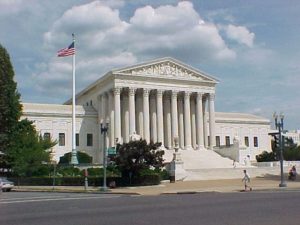 In 2015, the United States Supreme Court ruled that healthcare providers do not have the right to sue the government over Medicaid reimbursement rates. That case, Armstrong v. Exceptional Child Center, Inc., actually overturned a Ninth Circuit decision that permitted healthcare providers to initiate action challenging payments received by Medicaid.
In 2015, the United States Supreme Court ruled that healthcare providers do not have the right to sue the government over Medicaid reimbursement rates. That case, Armstrong v. Exceptional Child Center, Inc., actually overturned a Ninth Circuit decision that permitted healthcare providers to initiate action challenging payments received by Medicaid.
Although the state in question in 2015 was Idaho, the decision has been referenced by the state of California this week, in the case AIDS Healthcare Foundation v. Toby Douglas in the United States Court of Appeals for the Ninth Circuit.
Deputy Attorney General says Foundation has no case against the state
Carmen Denise Snuggs of the California Attorney General’s Office argued before the Ninth Circuit that the 2015 Armstrong decision takes the wind out of the sails of the AIDS Healthcare Foundation’s challenge of a state law that regulates Medicaid reimbursements and requires the use of discounted drugs.
Further, Snuggs told the panel that a lower court’s 2013 decision that struck down a state law reducing reimbursements to Medicaid providers receiving discounted meds through a federal program designed for uninsured and low-income individuals should be overturned.
Snuggs argued that the Supreme Court determined that the asserted provision of the federal statute, Section 30(a), is not privately enforceable by healthcare providers because it does not contain “congressional intent to create a private cause of action.”
“In 2015, the U.S. Supreme Court in Armstrong reviewed whether providers could proceed under the Supremacy Clause to enforce Section 30(A),” state attorney Snuggs told the federal appellate panel. “It held that the Supremacy Clause does not supply a cause of action, it doesn’t provide an implied right of action and it is not the source of federal rights.”
Plaintiff criticized law reducing reimbursements as discriminatory and a breach of Medicaid rules
The AIDS Healthcare Foundation’s claim rests on a federal law commonly used by healthcare providers when disputing Medicaid reimbursement rates; the law requires states to deliberate on the question of whether proposed rate adjustments are in keeping with “efficiency, economy, quality of care and access.”
In late 2009, the AIDS Healthcare Foundation responded to a change in California law that lowered Medicaid reimbursements to “safety net” providers using the program’s 340B discounted-drug plan by bringing action against the state’s Department of Health Care Services (DHCS). The Foundation argued that the law was discriminatory under the Fourteenth Amendment’s Equal Protection Clause and further, that it breached Medicaid regulations. The state, however, said that the new law decreased overpayments and increased the efficiency of processing claims.
In 2014, U.S. District Judge Manuel L. Real dismissed the equal protection claims but otherwise upheld the ruling. He stated that DHCS had not received approval at the federal level of the amendment and also had not adequately considered federal statute, Section 30(a) factors.
Snuggs pointed out to the Ninth Circuit that in the period of time since the filing of the suit, California’s “state plan amendments” (SPAs) had received the requisite approval from the Centers for Medicare and Medicaid Services (CMS).
“In addition, the state submitted adequate documentation that the modified rate, coupled with the dispensing fee, is adequate and should cover the cost to providing 340B drugs to Medicaid beneficiaries,” Snuggs added.
An attorney for the AIDS Healthcare Foundation noted that the purpose behind the discounted drug program was to give “safety net” providers the opportunity to save money, ostensibly to put those funds toward an expansion of services. He argued that the state is preventing those providers from benefitting from the discounts.
Supreme Court split in ruling but united in belief that Supremacy Clause fails to imply private action
In the Armstrong ruling that Deputy Attorney General Snuggs used to buttress the state’s argument this week, the providers of “habilitative services” were prevented from suing Idaho for a higher rate of Medicaid reimbursement. Under federal law, reimbursement is required to be “sufficient to enlist enough providers” so that Medicaid beneficiaries do not suffer from a lack of available services as compared to the public at large.
The decision centered around an interpretation of the U.S. Constitution’s Supremacy Clause, going back to opinions of the Founding Fathers prior to ratification of the constitution. Ultimately, the decision did not find that the clause permitted private parties to wield federal laws against states.
Though the ruling was 5-4, all the justices were in agreement that the Ninth Circuit had been incorrect in seeing the implication of private action under the Supremacy Clause. The dissenting opinion would have allowed private parties to attempt “equitable relief,” saying that the Medicaid Act failed to “demonstrate the requisite congressional intent to restrict the equitable authority of the federal courts.”
For more information/questions regarding any legal matters, please email [email protected] or call 310.203.2800.